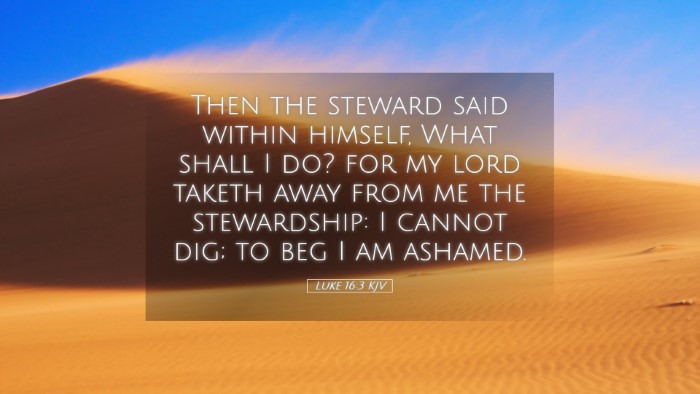Commentary on Luke 16:3
Verse Text: "Then the steward said within himself, What shall I do? for my lord taketh away from me the stewardship: I cannot dig; to beg I am ashamed."
Introduction
This passage from Luke 16:3 refers to a steward who learns that he is about to lose his position. The context of this scripture is essential for understanding the lessons it imparts regarding stewardship, earthly wealth, and the eternal implications of human actions.
Contextual Overview
In the broader narrative of Luke 16, the parable of the unjust steward is presented, which reflects Jesus' teachings on financial stewardship and accountability. This verse encapsulates the steward's inner turmoil upon realizing he could soon be unemployed, insufficiently armed with skills necessary for physical labor and socially unwilling to beg. The emotional and psychological aspects of his dilemma are critical for theological reflection.
Insights from Matthew Henry
Matthew Henry explores the intentions of the unjust steward, emphasizing his self-awareness of impending loss. He notes the steward's reflection and the proactive approach he takes in response to his crisis:
- Self-awareness: The steward faces the reality of his impending dismissal, prompting a critical introspection.
- Desperation: His admission of being unable to dig and unwilling to beg signals a significant dilemma—one that many face when confronted with societal and personal failures.
Henry emphasizes that this character's struggle reflects the human condition when confronted with loss and the fear of inadequacy. The steward's preemptive strategy also suggests a desire to secure his future, albeit deceptively. Henry warns about the consequences of such transient abandonments of integrity.
Albert Barnes’ Perspective
Albert Barnes provides additional layers of meaning, particularly concerning the steward's character and choices:
- Indications of Character: Barnes posits that the steward’s self-reflection demonstrates a cleverness that can be regenerated positively or negatively. While he is dubbed 'unjust', he paradoxically exhibits shrewdness in dealing with his coming misfortune.
- Social Commentary: The steward's reluctance to engage in labor or beg indicates societal norms regarding class and work. This portrays a prevalent attitude about social respectability, influencing how individuals respond to crises.
Barnes interprets this internal dialogue of the steward as a reflection of the broader human tendency to navigate life’s challenges through the lens of worldly wisdom, which often leads to morally ambiguous decisions. This insight speaks deeply to modern congregants navigating a secular financial landscape.
Adam Clarke’s Contextual Analysis
Adam Clarke expands the interpretation by situating the steward's struggles:
- Employment and Social Status: Clarke draws attention to the social hierarchy and the steward’s lost position, asserting that people often define their identity through their roles and responsibilities.
- The Dilemma of Integrity: As one who has been dishonest, the steward's challenge intensifies—he lacks the character needed to secure employment through honest means and is thus faced with dire alternatives.
Clarke brings forth the moral ramifications of this narrative. The steward’s thought process serves as a lesson in deceit versus honesty, underlining how one's choices can lead to an eventual reckoning.
Thematic Reflections
The parable of the unjust steward, particularly through the lens of Luke 16:3, raises profound themes for theological reflection:
- Stewardship and Responsibility: This passage highlights the serious nature of stewardship—not merely in financial terms but managing all gifts from God. The steward's impending loss serves as a reminder of accountability in all areas of life.
- Discipleship and Integrity: The immoral means by which the steward seeks to secure his future contrasts sharply with the call to live in a manner worthy of the Gospel. It challenges readers to consider their own ethical choices amid temptation.
- The Nature of Wealth: Jesus’ teachings often depicted wealth as a potential spiritual hindrance. This steward’s crisis symbolizes the fleeting nature of material possessions and status, urging believers to invest in eternal rather than temporal wealth.
- Human Condition: The steward's fear and anxiety over his future mirror the struggles of humanity when faced with loss and crisis, inviting readers to find hope and direction in God's providential care.
Conclusion
In conclusion, Luke 16:3 serves as a rich source of theological and practical insight for pastoral care, student learning, and scholarly inquiry. The reflections from Henry, Barnes, and Clarke navigate the complexities of integrity, societal pressures, and the nature of stewardship—all factors that remain relevant in contemporary discussions. The study of this passage urges individuals to calibrate their lives in accordance with God’s standards of faithfulness, equipping them to respond to crises with wisdom borne from a deep understanding of scripture.


